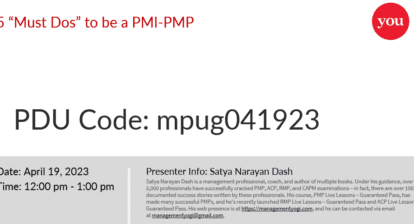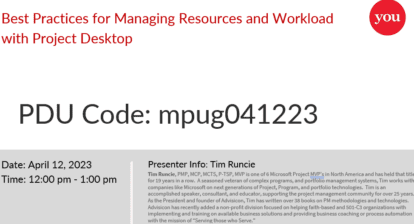Jim from Denver asks: My management has asked me to implement Microsoft Project Server and to have 500 people entering time by the end of the month to get resource allocations. We have installed the software. What do I need to do to accomplish this?
Ellen answers: Wow! That is quite a requirement — and probably impossible to meet. Sadly, this is not an unusual request. Microsoft Project Server isn’t a “plug-and-play” type of application. Project Server will help an organization manage projects across an organization, but it’s very different from managing projects using Excel or Word. Below are listed some dynamics that will need to be considered when approaching an Enterprise Project Management (EPM) implementation.
What are your goals for the usage of EPM? Your implementation will be successful if you could gain specifically what information from using the software?
Enterprise project management software will help you manage projects using your process for managing projects. EPM won’t manage the projects for you.
Are your users trained in project management concepts and do they understand project management terminology such as WBS, baseline, relationships, or tracking? Your project managers will use EPM more efficiently when they have an understanding of the lingo of project management.
For project managers to be successful in using EPM software, they should understand creating a work breakdown structure, assigning resources to tasks, and managing a project to a schedule. What are their current skills in this area You can expect better results when your project managers achieve these skills.
Project isn’t a product that lends itself well to self-training. Many project managers use Project, but only at a surface level. When using EPM, project managers must have a deeper understanding of Project. Just because you have smart people working for your organization doesn’t mean they’re smart in the process and usage of EPM. Training can’t be ignored — it is one of the major success factors.
What is the existing project management culture at your organization today? Are you using Excel to manage projects now Will the users accept the visibility of the status of their projects — and the accountability — within the organization?
How will your project managers accept and buy into the change in the project management process? How will EPM affect the culture at your organization, and will change management be needed to help gain acceptance and buy-in?
Does the organization have the technical expertise to handle EPM and its maintenance requirements? If not, how can you obtain that knowledge?
Do you have management support? Management should be involved every step of the way and support the progress points while heading toward goals.
These are some of the questions (and challenges) that need to be answered within organizations wanting to implement EPM. Consider the road to full enterprise project management a journey while taking small steps to get to your goal. Management can’t push the user base to achieve goals faster than their skills will allow them to progress.
Deploying Microsoft Project Server today won’t solve existing problems tomorrow. An EPM implementation is a project in itself and should be treated as a project and not an instant solution. EPM is a way of accumulating data to make better decisions regarding projects. But it takes time for users to accumulate the data (within a set of rules) before the data will be viable for decision making.






